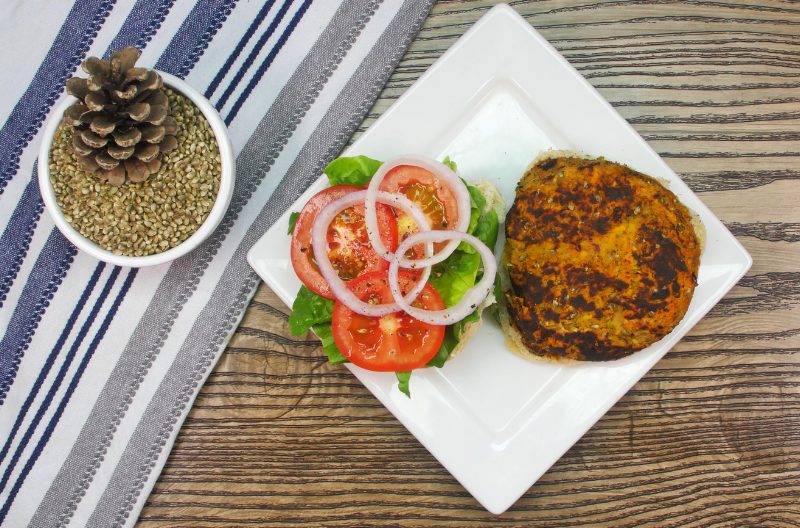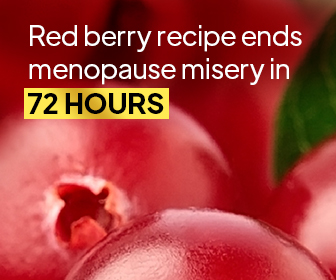Do you want to shake up your healthy diet? If you’re looking for the next best superfood, look no further. Hemp seeds, not to be confused with the marijuana species of the plant, are rich in nutrients and protein. Perhaps that’s why hemp seed recipes are just about everywhere at the moment.
Needless to say, they are a serious wellness trend. And you’d better believe the hype!
There are actually a whole slew of science-backed health benefits of hemp seed oil. If you want to know more, we’ve got you completely covered. Let’s take a moment to look at the facts and some of the tastiest recipes too.
What Are Hemp Seeds?
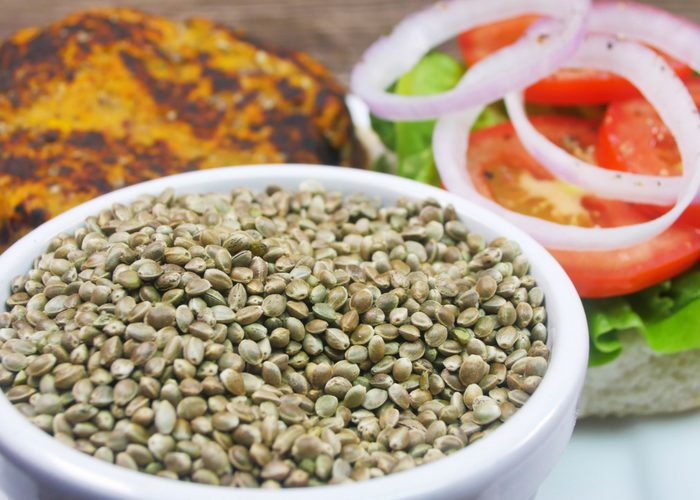
Before we take a look at some enticing hemp seed recipes, we need to deal with one burning question you may have – what are hemp seeds? The seeds come from hemp plants, which are part of the sativa plant species. The type of plant is found in the Northern Hemisphere and the seeds are extracted and used in a variety of ways.
One of the most common misconceptions about the hemp plant is that it’s the same as the marijuana plant. That is simply not the case. While the marijuana plant is part of the same species, it is specifically grown to have high levels of the tetrahydrocannabinol (THC) chemical. This chemical has psychoactive characteristics, which is why the marijuana plant is used to create the drug known simply as marijuana. While state law differs throughout the US, cannabis or marijuana is classed as illegal by Federal Law.[1]
However, the hemp plant from which we get hemp seeds only has a small amount or a trace of the THC chemical. Unlike the marijuana plant, the hemp plant does not have any psychoactive side effects. For that reason, it is perfectly legal to buy here in the US and has a variety of uses. You may find that it’s used in everyday items such as clothes, construction materials, biofuels, and even paper. Aside from that, it is used to make a whole range of wellness products such as hemp seed oil, health food, and supplements.
As though that weren’t enough, there are plenty of benefits of hemp seed oil and the seeds. Let’s take a look at some of the most important hemp seeds nutritional facts. According to the USDA Food Composition Database, hulled hemp seeds are high in protein with 31g of the stuff per 100g.[2] The same amount also has 4g of fiber, 70mg of calcium, and 1,200mg of potassium. All of the above information points to the same conclusion. Hemp seeds can offer a real nutrition boost.
What’s the Difference Between Whole and Hulled Hemp Seeds?
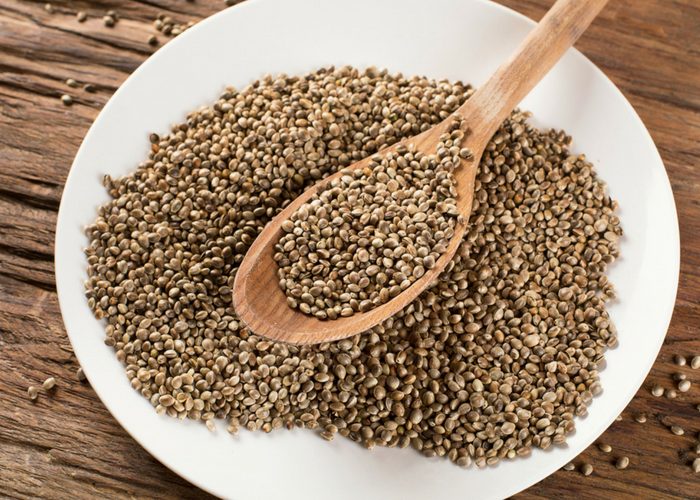
When you head to the store or look online for hemp seeds, you will notice that there are two types available. Before you choose a product to buy, you need to understand the difference between whole and hulled hemp seeds. Thankfully, the answer is a quick one.
Whole hemp seeds are the seeds in their purest form, with the crunchy outer shell still intact. Hulled hemp seeds (or hemp hearts, as they are sometimes known) have had the shells removed. You should get the hulled hemp seeds rather than the whole ones as they are ready to use. Plus, when you’re making the most popular hemp seed recipes, most of them call for hulled hemp seeds rather than the alternative.
What is Hemp Seed Oil?
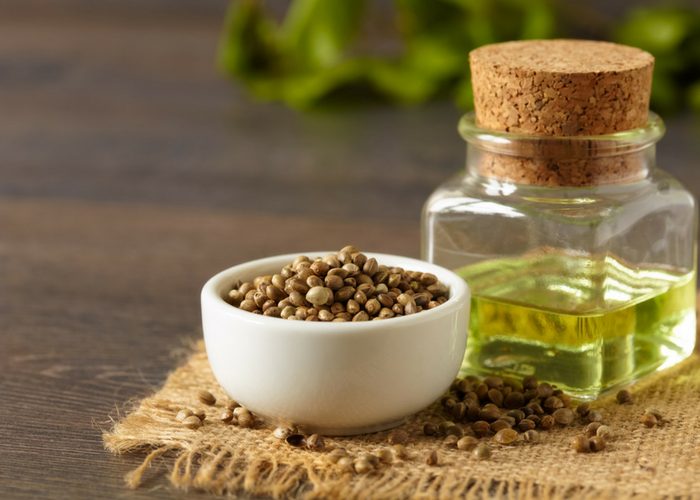
If you’ve seen hemp seed oil in health food stores, you may be wondering how it differs from whole hemp seeds. The oil is made by crushing hemp seeds from the common hemp plant. Much like the seeds, the oil product is low in cannabinoids and has only a trace of THC. There are many ways in which you can consume hemp seed oil. Here are a few ideas to get you started:
- Take a few drops orally before you sleep
- Drizzle it over dishes, such as salads and grains
- Include it in recipes, such as sauces and salad dressings
- Put a few drops in your morning smoothie
Note: You cannot use hemp oil for frying or cooking. The product has a low smoke point which means that it could catch fire when you put it over medium or high heat. Take care!
CBD vs Hemp Oil
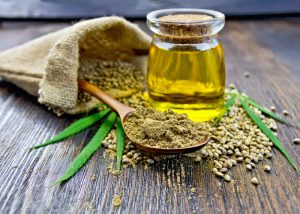
When we’re talking about the benefits of hemp seed oil, there’s one thing that you should know. It is not the same as CBD oil. There is a lot of confusion surrounding this topic. Let’s take a moment to look at the main differences and similarities between CBD vs hemp oil.
1. They come from different parts of the same plant
CBD is a cannabinoid oil, which comes from the flower and leaves of the hemp plant. On the other hand, as the name suggests, hemp seed oil comes from the seed of the plant, which is crushed up to make the oil.
2. They both have low traces of THC
As we’ve already covered, hemp seed oil will have extremely low traces of the chemical THC. CBD oil may have slightly higher traces of THC than hemp seed oil does, but it’s important to note that it will still be relatively low. What’s more, neither oils have levels that will produce psychoactive effects.
3. They each have varying uses
One of the serious differences, when we talk about CBD vs hemp oil, is how they’re used. CBD has a wide range of medicinal uses. It may be recommended for cancer patients to help alleviate pain. It is also used by those suffering from mental ailments such as depression, anxiety, and stress. Hemp seed oil is better known for its high nutrient composition. For that reason, it is used in making soaps, lotions, and in recipes too.
The Top 4 Hemp Seed and Hemp Seed Oil Benefits
1. It could help you lose weight
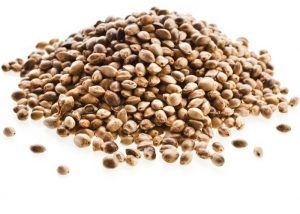
Trying to lose weight? Hemp seed oil and hemp seeds could be the answer. As we have already covered the main hemp seeds nutrition facts, you should be aware that these seeds are high in plant-based protein. Including just a small amount of the seeds or even the oil form in your eating plan could help you boost your protein intake while keeping your fat intake as low as possible.
Not only do hemp seeds offer healthy protein, but they could help you satisfy your hunger as well. One report from the University of Michigan suggests that people who consume this product feel less hungry and have few sugar cravings.[3] It also states that the high-fiber feature of these seeds could be beneficial to those who are obese or overweight and hoping to slim down.
2. May help you deal with PMS
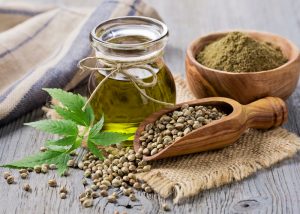
Dealing with PMS on a monthly basis can be something of a trial. During this part of the menstrual cycle, women can often battle behavioral, mood, and physical problems.[4] In extreme cases, experts have even suggested that women should be provided with extra medical and counseling support to help them when suffering.
The cause of some PMS symptoms could be the high level of prolactin that is present in women’s bodies during this time.[5] Perhaps one the more surprising benefits of hemp seed oil is that it can help to curb this problem. Research shows that the essential fatty acids in the oil can help to regulate the production of the prolactin hormone.[6] In theory, that means that taking a little hemp seed oil could help to reduce the symptoms of PMS.
3. Could help to improve your eczema
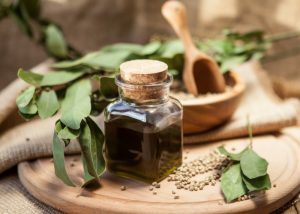
Eczema is an irritating skin condition that affects 31.6 million people in the US.[7] One of the most common forms of the health concern is atopic dermatitis, which is caused by a failure in the immune system. Those suffering from this condition will often have “flare ups” which include dry, itchy, red skin.[8] At times, the skin may also crack and bleed.
Suffering from this condition can be an ongoing battle, especially since the more you scratch the skin, the worse it gets. One of the most popular home remedies is using hemp seed oil. A 20-week long study into this remedy found that consuming the oil could decrease the number of clinical symptoms of the condition.[9] So, if you happen to be struggling with this problem, you may want to try the oil out for yourself.
4. Supports your immune system
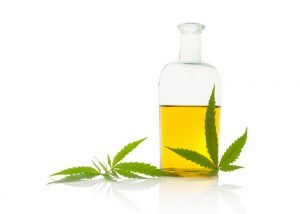
Your immune system fights off any viruses that enter your body. That means that the stronger this system is, the less likely you are to get ill on a regular basis. One thing some people fail to realize is that the life you lead and the food you eat can have a direct effect on how well your immune system functions.
While eating well and staying active both play a role in ensuring that this system works at a high level, adding extra superfoods to your diet can also help. Research suggests that the essential fatty acids found in hemp seed oil could have a dramatic effect on your immune system.[10] In fact, short-term studies on both animals and humans have found that one of the benefits of hemp seed oil is its ability to support this physiological area.
5 Tasty Hemp Seed Recipes
Are you trying to introduce more hulled hemp seeds into your everyday diet? It doesn’t have to be a chore. Luckily, there are loads of tasty hemp seed recipes out there and it won’t take you too long to understand the basics.
We’ve got some remarkable ideas for how you might include hemp seed in some of the most popular dishes and drinks. From a nutrition-packed hemp milk recipe to delicious hemp seed burgers, here are just five of the best hemp seed recipes to try for yourself.
1. Hemp Seed Burgers
Want to get your helping of hemp seed protein? There are loads of hemp seed recipes that pack a real protein punch. Let’s take this twist on the classic burger. The recipe combines kidney beans, which are a great source of plant-based protein, with sweet potatoes, carrots, onions, and more. Why not try this recipe for dinner tonight?
Prep Time: 10 minutes | Cook Time: 30 minutes | Serves: 4 | Calories Per Serving: 349 kcal
Equipment: Large saucepan, food processor, large knife, mixing spoon, chopping board, mixing bowl, potato masher, large skillet
Ingredients
- 2 large sweet potatoes
- 1 large carrot
- 1 cup of canned kidney beans
- 2 medium onions
- 1 cup of hulled hemp seeds
- ½ cup of parsley
- 1 Tbsp of ground garlic
- 1 Tbsp of nutritional yeast
- ½ cup of breadcrumbs
- Sea salt
- Ground pepper
- Olive oil
Instructions
- Boil some water in a large saucepan. Peel and chop the sweet potatoes into medium sized chunks. Put the chunks in the water and boil for around 15 minutes or until soft then drain.
- Once drained use a potato masher to mash them. Aim for a smooth and lump-free texture, then move to a mixing bowl.
- Rinse and drain the kidney beans. Place the kidney beans, onions, carrot and parsley into a food processor, and pulse the mixture until almost smooth.
- Add the mixture into the bowl with the sweet potato mash. Mix the veg into the mash so that it is evenly combined.
- Sprinkle in the nutritional yeast, ground garlic, and hulled hemp seeds into the bowl. Add salt and pepper to season. Fold these ingredients into the mixture.
- Add the breadcrumbs to the mix and stir gently. The crumbs should be evenly distributed throughout the burger mixture.
- Wash your hands and separate the mixture into four portions. Mold each portion into a burger-shaped patty.
- Heat the olive oil in a large skillet on medium heat. Place each of the burgers into the pan and cook for around 3-4 minutes per side. Ensure that they are hot all the way through before serving.
Serving Suggestions
Of course, the traditional way to serve this veggie burger is to toast a sesame seed bun, put on some relish and lettuce, and place the patty inside. If you’re trying to be healthy, you could make it a “skinny burger” and skip the bread altogether. You may also want to make your own vitamin-packed sauce or dressing for this nutritious hemp seed protein meal.
2. Lemon Hemp Seed Smoothie
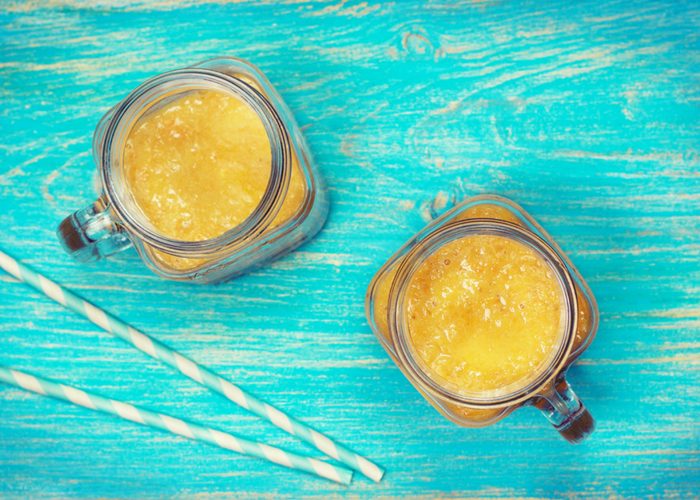
There are few better ways to start the day than by sipping on a healthy superfood smoothie. As we’ve already covered, adding hulled hemp seeds to your food could yield some rather impressive health benefits. So, without further ado, let’s take a look at one of the quickest and easiest hemp seed recipes to start out. Creating this drink should take you no longer than five minutes, making it the ideal morning time treat.
Make Time: 5 minutes | Serves: 2 | Calories Per Serving: 233 kcal
Equipment: Blender (or smoothie maker), large knife, chopping board
Ingredients
- 2 ripe bananas
- 1 cup of frozen strawberries
- ¼ cup of fresh lemon juice
- 1 Tbsp of honey
- 2 Tbsp of hulled hemp seeds
- Water
- Ice (optional)
Instructions
- Peel and chop the bananas into small chunks.
- Add the frozen strawberries, banana chunks, lemon juice, honey and hulled hemp seeds to a blender or smoothie maker.
- Mix until smooth. Add water to the smoothie to get the right consistency for you.
- Pour over ice and enjoy this healthy superfood drink.
3. Hemp Milk Recipe
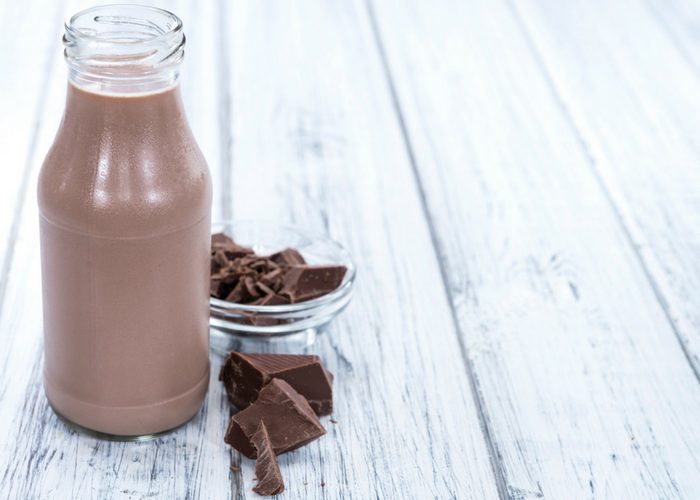
With the recent rise in veganism and plant-based living, there’s been a massive surge in people looking for milk alternatives. While there are loads of options now on the market, getting lactose free beverages can be rather costly. So, why not make your own? Some of the best hemp seed recipes focus on how to make your own milk. It’s much easier than you might imagine. If you follow this hemp seed recipe, you can pour the stuff on your cereal, use it in coffee, or just drink it on its own. Here’s what you need to know.
Make Time: 5 minutes | Serves: 6 | Calories Per Serving: 67 kcal
Equipment: Blender, strainer, sealed and sterilized bottle
Ingredients
- 3 cups of water
- ½ cup of hulled hemp seeds
- 1 Tbsp of agave syrup
- 2 Tbsp of cocoa powder
- 1 Tbsp of vanilla extract
- Sea salt
Instructions
- Pour the water, hulled hemp seeds, agave syrup, cocoa powder, and vanilla extract into a blender. Turn on and mix for around 30 seconds.
- Stop and check the consistency of the mixture. You may want to add more water at this point as needed.
- Blend the mixture for a further 30 seconds.
- Taste the hemp milk. Add sea salt for flavor or some vanilla extract and cocoa powder. Everyone’s tastes are different!
- Strain the mixture and pour into a resealable, sterilized bottle. Keep for no longer than five days in the fridge.
4. Chia and Hemp Overnight Oats
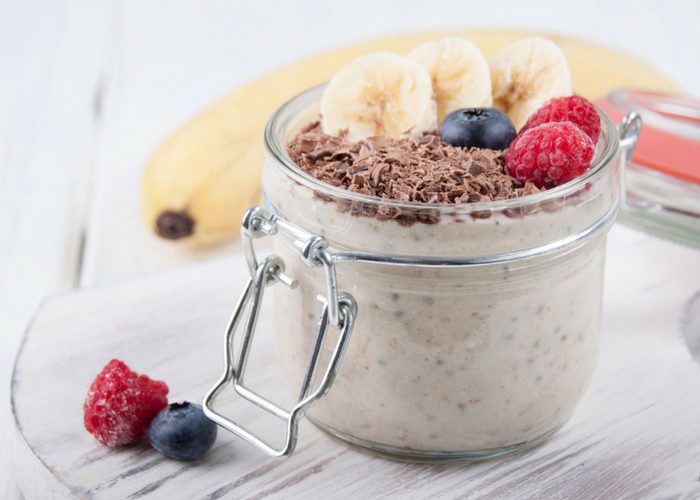
The chances are that you will already be well aware of the trend that is overnight oats. Breakfast has never been quite so Instagram-able. The truly excellent thing about these oats is that they give you slow-release energy throughout the day. Plus, they are seriously straightforward to make. Make sure you add this one to your list of favorite hemp seed recipes. You won’t regret it.
Make Time: 5 minutes | Chill Time: 4 hours | Serves: 2 | Calories Per Serving: 222 kcal
Equipment: 2 medium jars, large mixing bowl, mixing spoon
Ingredients
- ½ cup of rolled oats
- 2 Tsp of hulled hemp seeds
- 2 Tsp of chia seeds
- ½ cup of milk
- ⅓ cup of fresh blueberries
- Organic honey
Instructions
- Combine the rolled oats, hulled hemp seeds, chia seeds, and milk in a large mixing bowl.
- Pour the mixture equally into two medium-sized jars. Make sure to leave a little room at the top of each of them!
- Drizzle some organic honey on the top of the overnight oat mix for flavor.
- Wash the blueberries and divide them into two. Put them on top of each overnight oat mix (but make sure the lids can still fit on the jars!).
- Seal the jars and pop them in the fridge for at least four hours or overnight if you can. Open and enjoy.
Tip: Why not make your overnight oats vegan?
If you’re leading a plant-based lifestyle or are vegan, you might want to adjust this recipe to suit your needs. Luckily, there is a couple of small swaps you can do which will make hemp seed recipes like this one 100% animal-product free. Switch the honey for some agave syrup (which is a plant-based sweetener) and change the milk for a plant-based alternative, such as almond milk or coconut milk.
5. Hemp Seed Falafel
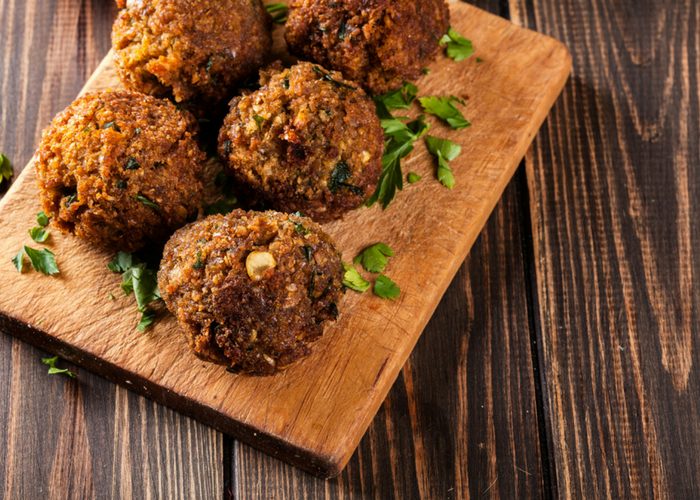
A favorite with vegetarians and meat-eaters alike, this Middle Eastern-inspired foodie delight is always a crowd-pleaser. Did you know that you could add some hulled hemp seeds into the mix to make this one even better? Doing so will give the meal some added health benefits in no time at all. With that in mind, let’s take a look at one of the best hemp seed recipes – this completely original take on falafel.
Prep Time: 5 minutes | Cook Time: 20-30 minutes | Serves: 5* | Calories Per Serving: 181 kcal
* Three falafel balls per recommended serving size.
Equipment: Food processor, large baking tray, baking paper
Ingredients
- 5 Tbsp of hulled hemp seeds
- 4 cups of canned chickpeas
- ¼ cup of parsley
- 1 Tbsp of curry powder
- 3 Tbsp of ground garlic
- 1 Tbsp of lemon juice
- 1 Tbsp of ground cilantro
- Sea salt
- Olive oil
Instructions
- Preheat your oven to 400ºF before you start preparing your falafel mix.
- Drain the chickpeas. Wash and chop the parsley into thin slices.
- Put the chickpeas, parsley, hulled hemp seeds, ground garlic, curry powder, lemon juice, and ground cilantro in the food processor. Pulse the ingredients until you have a thick and even paste.
- Season the falafel mixture with some sea salt and olive oil.
- Line the baking tray with baking paper. Wash your hands and then roll the mixture into 15 small balls. Place each of them on the prepped tray.
- Place in the preheated oven for 20-30 minutes. Turn the balls regularly to make sure that they cook evenly throughout.
Serving suggestions
Falafel can make a great accompaniment to almost any meal. Why not serve it with hummus and fresh salad in pita bread or a wrap? Alternately, you could always serve this dish on a bed of rice or couscous. Be creative and see what healthy meals and hemp seed recipes you can come up with. You might just discover something you love.
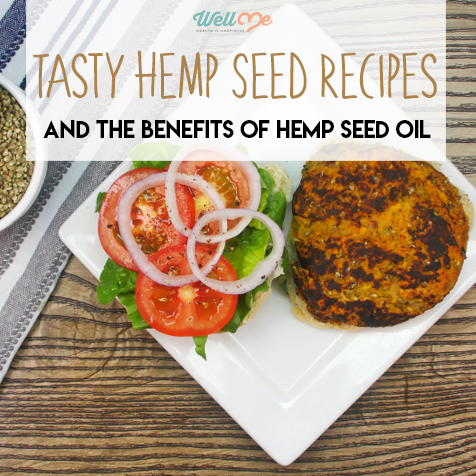
Conclusion
Adding some hemp seed recipes to your regular diet won’t take much effort on your part and could offer some astounding health advantages. Now that you fully understand the benefits of hemp seed oil and the seeds themselves, it’s time to make some positive changes that could have a major impact on your life. Not sure where to start? Try some of these recipes today and look up other hemp seed recipes and products online too.
References
- [1] https://www.safeaccessnow.org/federal_marijuana_law
- [2] https://ndb.nal.usda.gov/ndb/foods/show/302502
- [3] https://www.uofmhealth.org/health-library/hn-10013910
- [4] https://www.ncbi.nlm.nih.gov/pubmed/24678964
- [5] https://www.ncbi.nlm.nih.gov/pubmed/1009676
- [6] https://www.ncbi.nlm.nih.gov/pubmed/6400557
- [7] https://nationaleczema.org/research/eczema-facts
- [8] https://www.nhs.uk/conditions/atopic-eczema/symptoms
- [9] https://www.ncbi.nlm.nih.gov/pubmed/16019622
- [10] https://www.ncbi.nlm.nih.gov/pubmed/11802309

